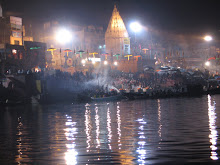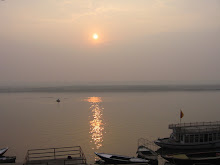The assassination of the charismatic Pakistani political leader, Benazir Bhutto, did not come as a surprise to me as it did to most people I knew. Without doubt the mindless cold blooded murder horrified me. But deep down, there had been this intuitive knowledge that Benazir would undoubtedly pay the price of being a strong, passionate and controversial Woman leader in an anarchic political milieu and an overly male dominated society.
Being a novice in politics with no interest in rectifying the lack of knowledge about the affairs of various countries across the world, I am not equipped to comment on the leader Benazir was.
But to the rank outsider that I was, Benazir Bhutto assumed larger than life dimensions the day she confidently stepped on to the center stage of world politics and assumed office as the prime minister of Pakistan. I was greatly impacted by this lovely, confident lady who looked to no man for moral support, made no apologies for her gender or even attempted to undermine her feminine charms and beauty as a concession to the hardened egos of the men around her. It was admiration that I watched Benazir adroitly,by virtue of her attitude, force the men around her to look past the surface and see the strength of the woman within.
It was with regret that I received the news of her banishment but Benazir, true to form, bounced back after 8 years. It was with a sense of pride that I followed Benazir’s path as she determinedly boarded the flight back to Pakistan, made light of her critics and detractors and refused to tuck tail and scurry for cover even after the first real attempt on her life.
Last night, as I watched the repeat telecasts and news bulletins about her last hour on this world, I could not help but wonder at the grit and strength of this lady who chose not to live in comfort in the bosom of her family with the exalted tag of a political émigré but instead returned to the land of her birth to pay her dues to her country and society. Surely Benazir, given her lineage and her tragic family background, knew the risks she ran by returning to Pakistan and throwing herself into the fight for democracy. And yet she had the moral strength to follow her heart and remain true to her cause.
To those who would dismiss her as a puppet of the west, I say that to find acceptance in this role, one would need to be suave, intelligent, a strong negotiator and capable of striking a chord with the leaders of the west. If Benazir, a woman in a society governed by the military and religious hardliners, managed to do that, then we should all doff our caps to her in salutation of her capabilities rather than disparage her.
As with most leaders of stature, there are bound to be voices to detract, to hint at profits made and coffers lined. But, what these critics need to understand is that, regardless of what the truth may have been, Benazir was a human being of integrity who did not take the easy way out even though her gender offered her the perfect reason to do so. Unlike most other woman, she opted not to live in comfort, in seclusion and in safety with her family. And the consequence: A waste of mother, wife and if I read the media reports right, a leader as well!!!...
Were I were given the choice of an epitaph for her, I would say ‘In Life, She Towered Over Men....May her soul now rest in peace.'
Friday, December 28, 2007
Monday, December 17, 2007
Homage with Filth?
In the past week, my travels took me to the fabled holy city of Varanasi where religious multitudes gather for a variety of reasons – to wash away their sins, to await their last and preempt rebirth, to buy peace for the soul of a loved one and sometimes, just to soak in the positive vibes and find peace.
I arrived in the city with much anticipation, but Banaras with its filthy streets, rough denizens and greedy priests, proved to be an assault on my senses from the very first moment. Even the boat ride on the Ganges at sunrise proved to be a highly overrated and far from tranquil experience, because of the filth bestrewn water.
If there is a river which has withstood sustained abuse and gross disrespect, then it has to be this holiest of holy rivers. As I was rowed across the length of the Ganges in the wee hours of the morning, past the crowded ghats where people performed all manner of ablutions in the purported holy waters, I could not help but wonder at the Indian psyche which is simultaneously, able to venerate and abuse.
What I mean to say is that almost every practicing hindu household has a corner for prayer and pooja, which is normally the cleanest nook in the house. We take great care to maintain the sanctity of this space. Shoes are a no-no. Flesh meant for consumption is carefully kept away. And, one enters this hallowed space only after much cleansing of one’s body.
In the hindu mind, the word 'holy' has as its handmaidens, cleanliness and deep reverence.
So in Varanasi, which is reputedly so sacred a land that death on its soil guarantees one a direct passage to heaven, it is only natural to assume it to be the very epitome of cleanliness and the recipient of much respect and reverence if not by visitors, then at least by its residents. On the contrary, one is greeted by the sight of human and animal excreta, plastic, paan and urine splattered walls, garbage of all kind and mindless littering.
A morning sail on the Ganges showcases life in India at its worst – people bathing and blithely washing their clothes, urinating, defecating, tossing overboard the remnants of their meal or the plastic bottles and bags in which they had carried their meal. We would not do this in our houses, let along in our corners of worship. So why desecrate this purportedly holy space and river which is deemed to be so many times more sacred than anything we can hope to create in our houses?
In the two days I stayed there, the only redeeming feature was the soothing sail across the Ganges in the twilight. As I bobbed about watching the Ganga Arathy, I wondered if the filth spread by the devotees and the greed of the priests had driven the gods away from the holy city. And as that thought crossed my mind, a gentle drizzle began, the arathy concluded and it occurred to me that perhaps, the Holy Ganges, like most mothers, wasn’t giving up on her children especially those who came seeking her with love, respect and hope.
I arrived in the city with much anticipation, but Banaras with its filthy streets, rough denizens and greedy priests, proved to be an assault on my senses from the very first moment. Even the boat ride on the Ganges at sunrise proved to be a highly overrated and far from tranquil experience, because of the filth bestrewn water.
If there is a river which has withstood sustained abuse and gross disrespect, then it has to be this holiest of holy rivers. As I was rowed across the length of the Ganges in the wee hours of the morning, past the crowded ghats where people performed all manner of ablutions in the purported holy waters, I could not help but wonder at the Indian psyche which is simultaneously, able to venerate and abuse.
What I mean to say is that almost every practicing hindu household has a corner for prayer and pooja, which is normally the cleanest nook in the house. We take great care to maintain the sanctity of this space. Shoes are a no-no. Flesh meant for consumption is carefully kept away. And, one enters this hallowed space only after much cleansing of one’s body.
In the hindu mind, the word 'holy' has as its handmaidens, cleanliness and deep reverence.
So in Varanasi, which is reputedly so sacred a land that death on its soil guarantees one a direct passage to heaven, it is only natural to assume it to be the very epitome of cleanliness and the recipient of much respect and reverence if not by visitors, then at least by its residents. On the contrary, one is greeted by the sight of human and animal excreta, plastic, paan and urine splattered walls, garbage of all kind and mindless littering.
A morning sail on the Ganges showcases life in India at its worst – people bathing and blithely washing their clothes, urinating, defecating, tossing overboard the remnants of their meal or the plastic bottles and bags in which they had carried their meal. We would not do this in our houses, let along in our corners of worship. So why desecrate this purportedly holy space and river which is deemed to be so many times more sacred than anything we can hope to create in our houses?
In the two days I stayed there, the only redeeming feature was the soothing sail across the Ganges in the twilight. As I bobbed about watching the Ganga Arathy, I wondered if the filth spread by the devotees and the greed of the priests had driven the gods away from the holy city. And as that thought crossed my mind, a gentle drizzle began, the arathy concluded and it occurred to me that perhaps, the Holy Ganges, like most mothers, wasn’t giving up on her children especially those who came seeking her with love, respect and hope.
Subscribe to:
Comments (Atom)






